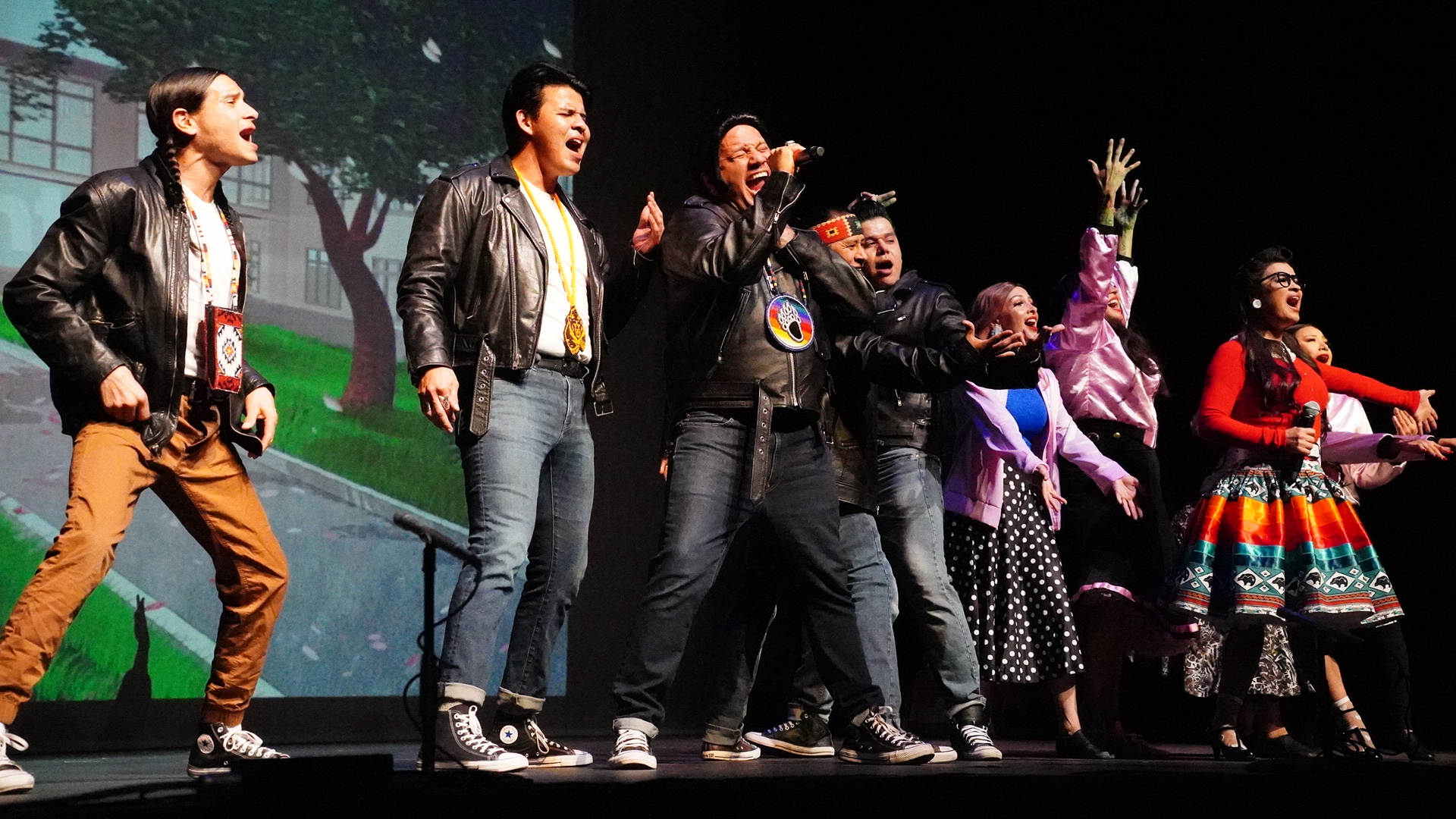
- Details
- By Darren Thompson
Bear Grease features an all-Indigenous cast that sings, dances, and jokes about romantic crushes, lovemaking and relationships while dressed in popular culture costume.
During a 30-day tour, the production scheduled an event organizers have always wanted to attend—the Gathering of Nations Powwow. Their weekend shows were hosted at KiMo Theatre, a historic landmark on Route 66 in downtown Albuquerque, to crowds taking a break from the powwow.
“We were so excited about Gathering [of Nations] weekend,” Crystle Lighting, director and one of the writers behind “Bear Grease,” told Native News Online. “We’ve been trying to get there for a while and things just never worked out. Our cast has never been to Gathering of Nations and we were all so excited.”
A million Native people from Canada and the United States, all together at the same place, we wanted to provide an exciting experience for those in town for Gathering”.
“Bear Grease” was written by both Lightning and Henry Andrade — also known as MC RedCloud — both actors and hip-hop artists that formed a duo called LightningCloud. The show is Lightning’s directional debut.
“It’s not the Grease you expect, but it’s the Grease you need to see,” Lightning said when explaining the show. “Most people are expecting to see an enactment of the movie we grew up seeing, but it’s not.”
The play has a sound unlike the film, said Lightning. The show includes hip-hop, parody, improv, freestyle, humor, and a solo song sung in the Cree language.
“The number one factor for creating this show was making sure this was fun for the audience,” Lightning said. “To hear the audience laugh makes all of this hard work worth it.”
Audiences learn of Indigenous culture while laughing at the uniqueness of Native humor.
“Frybread Grease” or “Bannock Grease” were two of the names considered for the show’s title, but the show’s writers thought one name or the other was too divisive. Bannock is considered “too north,” and frybread is “too south.”
“Bear grease is universal, and we want people to ask us what bear grease is,” Lightning said. “Bear grease is what makes it Indigenous. There’s so much medicine through laughter, and there’s so much medicine in bear grease, too,” she said.
Lightning is from the Enoch Cree Nation (Maskekosak) in Alberta, CA. She has been working in the film and television industry since she was nine years old when she landed her first lead role in the feature film “3 Ninjas: Knuckle Up”. Since, she has made appearances in front of the camera in “Yellowstone,” “Outlander,” “Rutherford Falls,” and “Ghosts,” and is currently in the Amazon series “Three Pines”.
“Bear Grease” includes the talents of 10 Indigenous actors, including Lightning and Andrade. Each performer has a solo appearance, from singing on a hand drum to playing the flute, giving the audience an opportunity to see and experience the diversity of their talents.
Although humor is an expected twist to the storyline, how it is used is also important. Trauma often fills the stories of many Indigenous people, but that doesn’t mean it should be avoided, said Lightning.
“We address our truths in our communities, such as what happened in boarding schools, but add humor to it as well,” Lightning said. “But we absolutely want to acknowledge that we respect our elders and the journey they have gone through.”
More Stories Like This
Zuni Youth Enrichment Project Takes Top Emerging Artist Apprentices to Phoenix for Artistic Exploration and Cultural ImmersionFrom Dishwasher to Award-Winning Chef: Laguna Pueblo's Josh Aragon Serves Up Albuquerque's Best Green Chile Stew
Rob Reiner's Final Work as Producer Appears to Address MMIP Crisis
Vision Maker Media Honors MacDonald Siblings With 2025 Frank Blythe Award
First Tribally Owned Gallery in Tulsa Debuts ‘Mvskokvlke: Road of Strength’
Help us defend tribal sovereignty.
At Native News Online, our mission is rooted in telling the stories that strengthen sovereignty and uplift Indigenous voices — not just at year’s end, but every single day.
Because of your generosity last year, we were able to keep our reporters on the ground in tribal communities, at national gatherings and in the halls of Congress — covering the issues that matter most to Indian Country: sovereignty, culture, education, health and economic opportunity.
That support sustained us through a tough year in 2025. Now, as we look to the year ahead, we need your help right now to ensure warrior journalism remains strong — reporting that defends tribal sovereignty, amplifies Native truth, and holds power accountable.
 The stakes couldn't be higher. Your support keeps Native voices heard, Native stories told and Native sovereignty defended.
The stakes couldn't be higher. Your support keeps Native voices heard, Native stories told and Native sovereignty defended.
Stand with Warrior Journalism today.
Levi Rickert (Potawatomi), Editor & Publisher

